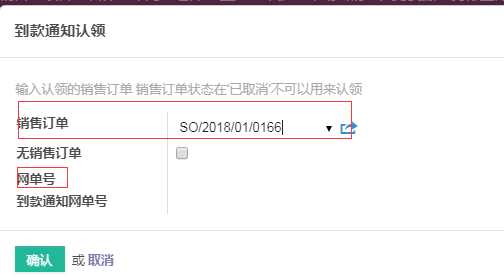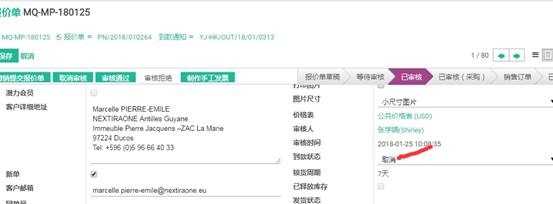前言:
当我们建立一个记录后,随着后面的流程,这个记录有些字段是要更改的
采用onchange更改
@api.onchange(‘sale_id‘)
def onchange_sale_id(self):
if self.sale_id:
self.sale_order_site = self.sale_id.sale_order_site
sale_id = fields.Many2one(‘sale.order‘, ‘Sale Order‘,
domain=lambda self: [(‘user_id‘, ‘=‘, self.env.uid),(‘state‘,‘!=‘,‘cancel‘)],
)
当我们改变销售订单,对应的网单号就会跟着变
采用compute 更改
@api.one
@api.depends(‘amount‘,‘back_amount‘,‘currency_id‘,‘payment_date‘)
def _get_amount_net(self):
amount_net = 0.0
currency = self.env[‘res.currency‘].search([(‘name‘, ‘=‘, ‘USD‘)], limit=1)
if currency:
amount_net_orig = self.amount - self.back_amount
if amount_net_orig:
if currency.id != self.currency_id.id:
from_currency = self.currency_id.with_context(date=self.payment_date)
amount_net += from_currency.compute(amount_net_orig, currency)
else:
amount_net = amount_net_orig
self.amount_net = amount_net
amount_net = fields.Float(compute=‘_get_amount_net‘, string=‘Amount Net‘,digits_compute=dp.get_precision(‘Account‘),store=True)
这样就会根据 ‘amount‘,‘back_amount‘,‘currency_id‘,‘payment_date‘ 的变化来计算
amount_net 的值,这里要注意,要改变的字段,一定要调用这个计算方法 如:
compute=‘_get_amount_net‘, 若不加在指定的字段上,你在方法中写self.amount_net = xxx 这样是不会保存在数据库中的
采用其它操作时更改
比如当我取消订单时 要改变记录一些字段的值
if order.apply_type ==‘cancel‘:
yj_robot_id = self.env.ref(‘base.user_yj_robot‘).id
order.sudo(yj_robot_id).action_cancel()
if order.agreed_apply_users_type:
order.sudo(yj_robot_id).agreed_apply_users_type = None
if order.payment_state:
order.sudo(yj_robot_id).payment_state = ‘cancel‘
注意事项:
权限很麻烦 ,有时仓库在出货,要改变销售订单的出货状态,这要求仓库人员有 写的权限
但我们又想,给他们,这时就在代码中临时给一个高权限的用户操作 采用 sudo()方法来操作
比如我上面
order.sudo(yj_robot_id).payment_state = ‘cancel‘
yj_robot_id 这是我自己建立的一个高权限用户,专门用来处理少权限的操作


